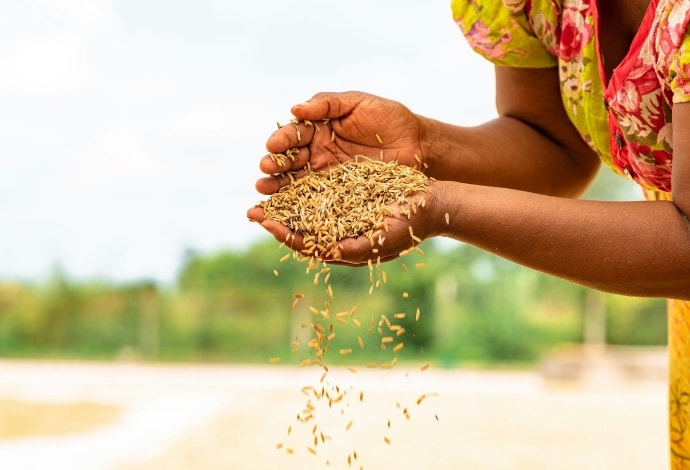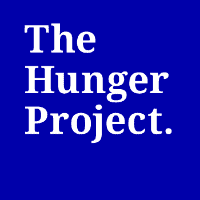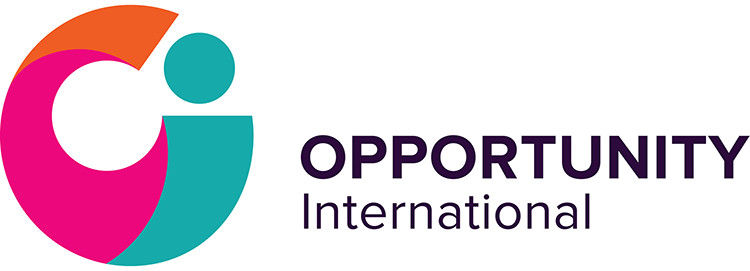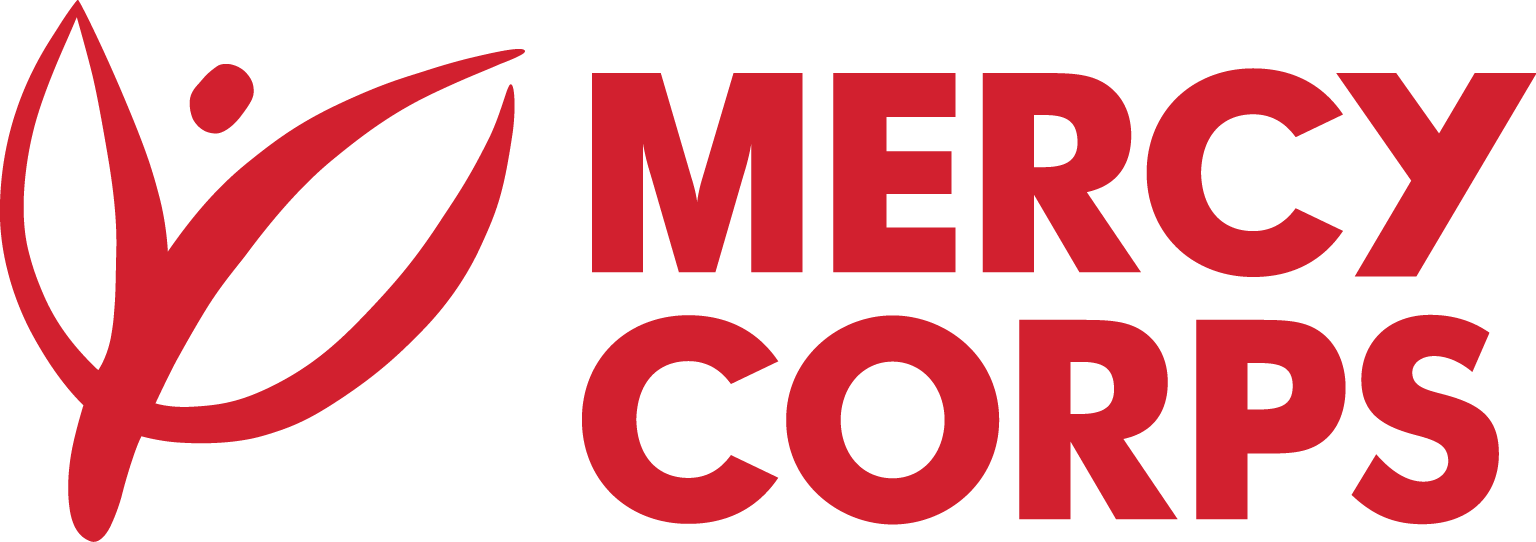The Methods our Members are Employing to Ensure Food Security
By Joel Meyers

Tanzanian woman pouring harvested rice from her hands. Photo: Ali Mkumbwa/UnSplash
Billions of people still lack access to nutritious, safe, and sufficient food. According to FAO, hunger and food insecurity trends are not yet moving in the right direction to end hunger and food insecurity (SDG Target 2.1) by 2030. Yet progress is being made across many countries, and different agricultural models and practices, growing awareness and practices for developing climate resiliency, and new agricultural finance tools and reforms are proving successful.
In this month’s Issue Brief, GlobalWA looks at how members are innovating, fine-tuning existing proven solutions and are moving the needle towards greater food security in the communities where they work.

The Hunger Project takes a very localized approach, developing skills and leaders from within the communities. They have three pillars to their approach:
Start with women: Studies show that when women are supported and empowered, all of society benefits.
Mobilize Communities: The Hunger Project provides trainings to build people’s capacities, leadership, and confidence, and envision their future and take action.
Engage Local Government: The Hunger Project works in partnership with local government bodies to ensure that they are effective, include the leadership of women, are directly accountable to local people, and provide access to resources and information.
Key to the success of their efforts is ensuring a mindset shift from “I can’t” to “I can” to “We can.” They achieve this through their VCA, or “Vision, Commitment & Action,” workshops where villagers are guided to envision the future they want, outline the steps to accomplishing their vision, and commit to the actions needed.
This formula has proven successful, having reached an estimated 12.4 million people in 9,500 partner communities in 1,200 project sites.

The Bill & Melinda Gates Foundation has a keen eye on climate change and climate adaptation when it comes to food systems and food security. The Gates Foundation recognizes that smallholder farmers are the ones feeling the largest impact of climate change and has committed $1.4 billion to help meet climate adaptation needs. More than 2 billion people depend on smallholder farms for food and income, yet less than 2% of global climate finance is devoted to helping these farms adapt to climate change. The funded projects focus on smallholder farmers in sub-Saharan Africa and South Asia with the main goals to build resilience and food security.
One such project is in partnership with Institute of Crop Science at the Chinese Academy of Agricultural Sciences (CAAS) which focuses on strengthening rice seed systems in West African countries. The project goals are to emphasize the integration of breeding, production, and extension to help more smallholder farmers meet the challenges posed by climate change. The project team works with Chinese and African breeding experts to breed new rice varieties, including customizing the Green Super Rice (GSR) varieties that can produce high yields even under extreme climate conditions to suit local environments.
The results have been very promising. Through four demonstrations sites during 2022’s dry season, and local farms in Mali, these new rice varieties created on average 30-50% higher yields. Hybrid rice seed production trials have also been successful in these local environments.

Opportunity International believes, and has aptly proven, that with financial solutions and training, people living in poverty become empowered to transform their lives and their communities. Their services focus on microenterprise, working with financial institutions to cater to communities’ needs and situations, training to build agriculture and business acumen, programs and training to enhance education opportunities, and building individual and community leadership.
Their Agriculture Finance (AgFinance) arm focuses on smallholder farmers – especially women – and addresses the issues of low crop yields, lack of available finance, lack of business training, and climate change.
Core to their AgFinance work are Farmer Support Agents, or FSAs, who are farmers, community leaders, and agents of change who connect directly with fellow farmers to help them access finance, improve their farms, and increase their incomes. They are digitally equipped with a smartphone and taught to use a data collection tool and training content.
FSAs provide fellow farmers with training on business, finance, agriculture practices, and group dynamics. These farmer groups also have access to support for information on distribution, markets, and a network of farmers to learn from.
FSAs teach farmers on how to produce higher yield crops and climate resilience, such as regenerative agriculture practices including minimizing soil disturbance, maximizing crop diversity, keeping the soil covered, maintaining a living root year-round and integrating livestock.

Mercy Corps, similar to Opportunity International, holistically examines smallholder farmers’ needs with an agricultural finance (AgriFin) and localized lens, creating customized approaches. They employ a market facilitation model to drive collaboration and innovation for smallholder agriculture between financial institutions, mobile networks, educators, tech start-ups & government.
Through their research and human centered design approach, they apply various tools, training including digital literacy, technologies, and partner-created innovations to create highly tailored bundled solutions.
Mercy Corps has invested in digital technologies extensively as they believe through digital literacy and useful technology, farmers can gain direct access to a range of inclusive and empowering financial information, platforms, and market access services. They start simply and as digital literacy increases with the farmers, sequentiall add more complex products.
One example of a tech innovation that has proved its usefulness and viability, is AgriPay, Zambia’s first digital banking platform for farmers. Partnering with ZANACO, the largest bank by customer size in Zambia, AgriPay is a mobile-based platform that provides a holistic suite of financial services designed for smallholder farmers. The platform is designed to be gender-inclusive to ensure the product was suitable for women as well as men. Read a case study here.

Food security for World Vision involves not only providing immediate and reliable hunger relief but also training on long-term agriculture and market solutions.
When there are conflict or natural disaster emergencies, or when poverty or circumstance occludes access to proper nutrition and adequate calories, World Vision will employ one or more mitigating programs such as emergency food rations, cash transfers, food vouchers, school feeding programs, and nutritional supplements focused on babies and those with severe illness.
For more sustainable and climate resilient solutions, World Vision provides training on agriculture and farming practices, improved seed access and cultivation, soil and water management, market access, nutrition, and dietary diversity.
World Vision’s various programs assist over 100 million people across 100 countries, and one USAID-funded program World Vision leads is ENSURE which improved lives of more than 215,000 in Zimbabwe. ENSURE — Enhancing Nutrition, Stepping Up Resilience and Enterprise — targeted six districts across Manicaland and Masvingo provinces and worked in partnership with the government, local leaders, and other nongovernmental organizations to improve food security and livelihoods through agriculture and economic empowerment programs, improving health through nutrition programs, and improving natural resource management through environmental stewardship programs. Key among the community resilience interventions are small-dams, small-scale irrigation schemes, and community gardens.
Many lessons were learned throughout this program with potential for wider applications in other similar agro-ecological zones in Zimbabwe and other countries highly vulnerable to climate shocks and and disruption:
- The need for shifting the paradigm in agricultural development to reduce dependency on rainfed agriculture and monocropping.
- The transformative power of small-scale irrigation schemes for building the resilience of smallholder farmers.
- The garden is also a platform for sharing knowledge, innovation, and practices.
- Gender equality has brought fundamental economic and social change in the community, which has been a game changer.
- Strengthening community-owned institutions and linkages with local government and authorities.
- Sustainability of community assets when ENSURE ends: The overwhelming response among interviewed farmers and community leaders was that they will sustain the assets they have created after ENSURE ends.
Read more about ENSURE here.

Grow Further takes a more fundamental approach to food security: agricultural innovation. They connect Indvidual donors, scientists, and farmers to incubate ideas and innovations to produce more nutritious, profitable, and climate-change ready crops and livestock.
There is a gap in funding models between scientists in low- and middle-income countries and granting agencies that can provide the necessary funding. Grow Further fills this gap with their process and platform which allows connectivity between individual funders who care about food security and the scientists developing agricultural innovations, with the end-goal to accelerate the development of agricultural innovation for the benefit of smallholder farmers.
One such project is enhancing Bambara groundnut production, adoption, and utilization for food security and increased income among smallholder farmers in northern Ghana. Bambara groundnuts are a highly nutritious bean which can be processed into oil, flour, and milk. The challenge is that yields are low and there has been little scientific research on increasing yields or producing varieties, and it has not yet been commercialized for wider distribution.
Grow Further will provide a grant over 3 years to cover all research and development costs associated with the project. The grantee is the Council for Scientific and Industrial Research-Savanna Agricultural Research Institute (CSIR-SARI), a public scientific research institution in Tamale, Ghana with key partners of Ministry of Food and Agriculture of Ghana, agricultural extension services; Seed Producers Association of Ghana for seed production; Heritage Seed Company LTD for seed production; and Rural Agrihub and WhatIf Foods for purchasing and processing of Bambara groundnuts.
By working closely with women farmers and other stakeholders, the project’s goal is to understand the agronomy and economics of Bambara groundnut production, particularly which traits are most desired, and breed the first commercial variety accordingly. It will develop innovation platforms that link research and development with agricultural extension (e.g., through on-farm trials). It will also conduct trials to develop recommended management practices (especially plant spacing, fertilizer, and weed control) and work with the private sector to develop seed production systems and markets.
The project aims to develop the first variety of Bambara groundnut in 3 years and release it commercially in the 4th year. Not only is Grow Further providing the grant to cover research and development costs, they will also provide capacity building, particularly around monitoring and evaluation and marketing and communications.
As you have read above, GlobalWA members are applying conscientious, holistic strategies, new innovative techniques and technologies, and are creating strategic partnerships to help ensure food security not only for their constituent communities, but as examples for the rest of the world to learn from.
The following member organization have issued summary statements about their food security work in communities where they work, followed by a list of Pangea Grant Partners who work on food security.
Global Communities works at the intersection of sustainable development and humanitarian assistance to deliver emergency food aid, support climate-resilient agricultural practices, and promote healthy diets in communities affected by crises, hunger and malnutrition. In Gaza, for example, where more than 2 million people — 96% of the conflict-affected population — face high levels of acute food insecurity, we have partnered with the World Food Programme (WFP), the World Central Kitchen and other stakeholders to distribute food parcels, bread, hot meals and nutrient supplements. In Central America’s Dry Corridor, our Honduras Agricultural System Support (HASS) program teaches sustainable, climate-smart farming practices and strengthens the resilience of local households to withstand extreme weather events, such as prolonged droughts. In Central America, Madagascar and Tanzania, our integrated McGovern-Dole Food for Education Programs offer daily nutritious school meals to more than 1,000,000 students. These programs also support local farmers, link them with schools, and utilize school gardens to promote nutrient-rich, diverse diets. In Ethiopia, which is experiencing one of the longest droughts on record, our Resilience in Pastoral Areas program enhances pastoral and agro-pastoral production, promotes optimal rangeland management for sustainable livestock farming, and leverages behavior change communication strategies to foster positive nutrition behaviors. And in Tanzania, Global Communities is piloting the “Women Forward” framework, which assists women smallholder farmers in climate-resilient food production and the development of market-based agricultural enterprises that enable them to sell certified, drought-tolerant maize and bean seeds.
Mercy Corps is honored to work with nearly 4 million people in our many food security programs – which are absolutely crucial as global hunger and food prices remain high.
Conflict, extreme weather, and economic shocks—including fallout from the COVID 19 pandemic—continue to be the main drivers of food insecurity globally. Many of these events are interconnected, creating a cycle of unfavorable conditions that can be broken.
Mercy Corps works with communities, local organizations, and authorities to identify the root causes of food insecurity and malnutrition. We use this knowledge to develop comprehensive and inclusive programming aimed at improving nutrition and achieving food security.
We don’t just improve people’s access to nutritious food—we also address the underlying issues that keep people from accessing it and making healthy use of it in the first place. When we include food security and nutrition as part of our programming, whether it’s dealing with conflict, climate change, or another issue, we create enabling conditions for people to strengthen their foundation of well-being.
Years ago, when Gasinzigwa, the Batwa chief of Bwiza Village, was asked why they no longer sang and danced, he said, “Because we are hungry.” Years later, his grown son, Jean Marie, explained.
“If someone is born in the wild, it seems like they are locked in a cage. You are desperate and dying … You are eaten by snakes and wild foxes. To be rejected by the rain and the sun… The feeling is not at all easy … You cannot change the grief caused by the history of hunger that was very severe. But we bear it.”
These testimonies, our population surveys, and the finding of 57% stunting of young children, relative to WHO standards, convinced Pygmy Survival Alliance to make food security job #1. Sometimes food is medicine, too.
Our toolkit for SDG2 includes improved agriculture, including arable land, tools, seeds, fertilizer, terraces and kitchen gardens; improved livestock, including goats and rabbits; and improved nutrition including vitamins and deworming for children, porridge and eggs in early childhood, and breastfeeding and nutritional education for families.
Before we started, more than half the babies died before age 5. Today, most survive, and for most people, constant hunger is just a painful memory.
The Hunger Project (THP) is dedicated to promoting sustainable food security by mobilizing communities to build resilience and long-term self-reliance. By addressing the root causes of hunger, local communities implement solutions that lead to lasting change. At the heart of our approach is the promotion of women’s leadership, recognizing that women play a critical role in food security and community development. We work closely with grassroots communities to mobilize local action, ensuring that solutions are adapted to the specific needs of each area, making them more effective and sustainable.
Through our programs, we support small shareholder farmers in sustainable agricultural practices that improve crop yields, restore soil fertility and enhance local food systems. Rural communities work with both climate-smart technologies and Indigenous knowledge to adapt to environmental changes and ensure consistent food production. Traditional knowledge and indigenous practices are preserved and promoted, as they are vital to combating malnutrition and supporting biodiversity.
Our holistic approach integrates gender equality, grassroots leadership and collaboration with local governments, creating robust food systems that thrive over time. By mobilizing individuals to take charge of their own development and fostering locally driven solutions, we believe that people can build resilient, self-reliant communities that are better equipped to achieve long-term food security for future generations.
Due to the threat of climate change, inflation, population growth, and water scarcity, many around the world lack access to healthy, local, and nourishing food. At World Concern, we adopt a holistic, integrated approach that recognizes the interconnectedness of various factors influencing access to nutritious food. We focus on the provision of immediate food aid, but also on sustainable agricultural practices, nutrition education, and community engagement. We implement food security programs in ten countries worldwide: Bangladesh, Chad, DRC, Haiti, Kenya, Laos, Myanmar, Somalia, South Sudan, and Uganda. World Concern partners with communities to increase households’ food production, farm income, and environmental conservation. Additionally, our projects support livestock related interventions, such as administering vaccines, improving breed selection, and distributing livestock, to improve families’ financial and food security. Our facilitators work with rural farmers to increase their market access for their crops, livestock, and agronomy products. Increasing opportunities for local food production and market access offers sustainable ways for families to produce nutritious food for the long-term. Through these various activities, we aim to create lasting change and witness the transformation of improved health and livelihoods for the communities we serve.
Yemen Relief and Reconstruction Foundation
The Yemen Relief and Reconstruction Foundation (YRRF) is combating child malnutrition across Yemen, where years of conflict, economic hardship, and climate extremes have triggered acute food shortages. Over 17 million Yemenis face daily hunger, and children are especially vulnerable, with many suffering from Severe Acute Malnutrition (SAM) and Moderate Acute Malnutrition (MAM). We focus on the country’s hardest-hit regions, offering specialized nutritional care, including high-protein formulas and extended follow-up to promote recovery and reduce relapse rates. Additionally, we educate parents on proper feeding practices, enabling them to support their children’s long-term health and development.
Our community-based approach builds trust and ensures life-saving aid reaches those who need it most. Since the start of this year, we have reached over 2,600 children across remote, underserved areas where food and medical resources are scarce, yet the need remains immense. With your support, we can expand our programs to reach even more children, restoring health and hope in Yemen’s most vulnerable communities. Join us in creating a brighter, hunger-free future at yemenfoundation.org. Each contribution helps move us closer to a world where no Yemeni child suffers from hunger.
Pangea Grant Partners
Ewang’an Olosho Le Suswa (Ewang’an), Kenya
Ewang’an works with Masaai villages in the Rift Valley of Kenya. This year’s grant is supporting training of women and youth in 3 villages to develop more resilient agricultural practices as they struggle to cope with the effects of climate change. Their program will also provide training to support gender equity and reduce gender based violence. In past years, Ewang’an programs have also helped women develop their own enterprises as part of a strategy to keep children in school longer.
Grant Goals: Train 60 women and 20 youth in 3 villages to improve food security and develop resilience through gender and entrepreneurship training.
Green Community Volunteers (“GCV”), Laos
Green Community Volunteers (GCV) was founded in 2009 and operates in Luang Prabang Province in North Central Laos. GCV is the only local group in Laos that has been founded and run by indigenous women and it seeks to empower communities on environmental issues such as biodiversity preservation through art and cultural exchanges. Earth Rights International first introduced Pangea to the work of GCV.
Grant Goals: Build leadership capacity for indigenous youth and women to advocate for environmental issues, land rights, and food security. Provide training on sustainable agriculture and women’s health issues.
Taa’ Pi’t, Guatemala
Taa’Pi’t is an intercultural learning center for Tz’utujil Mayan children. Children have the unique opportunity to gain computer literacy and to learn to care for “Our Mother Lake” (Lake Atitlán) through an environmental education program based on the Mayan cosmovision and built on the strengths of the Mayan culture. The benefits of these programs are far-reaching: profoundly changing the capabilities and attitudes of the children, influencing their families and the community, and helping to strengthen the Maya Tz’utujil cultural heritage. With Pangea project funds, Taa’ Pi’t is continuing to address the issue of undernourishment in the community by offering cooking classes, re-introducing healthy and traditional Mayan cuisine, and supporting local organic farmers.
Grant Goals: Educate Tzutujil Maya women and children in nutrition, health, culture, sustainable farming, women’s income generation, and environmental stewardship.
Ufanisi Women’s Group (UWG), Kenya
Ufanisi Women’s Group (UWG) serves extremely poor, vulnerable rural women and girls in Bungoma County, Western Kenya. For the past several years, the group has been working toward building a sweet potato enhancement business, first by increasing farmer’s production of sweet potato vines, then by beginning to make enhanced products like chips, cookies, and pies. This year’s grant will support the group in taking the next steps by purchasing larger capacity equipment for production and storage, opening a sales stall in the nearest market town, and exploring other marketing opportunities.
Grant Goals: Expand their sweet potato product enrichment business and open a market stall in Bungoma.